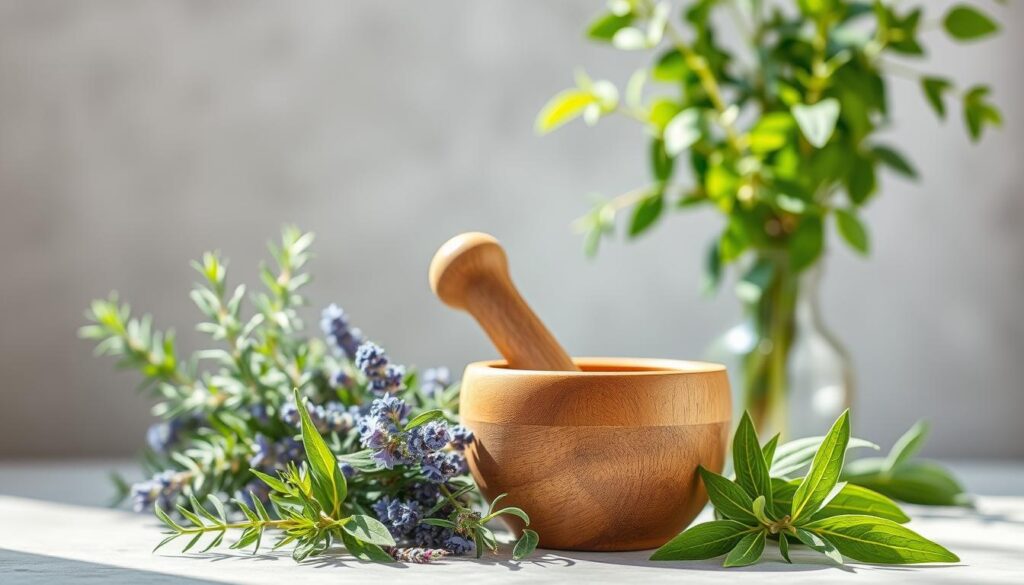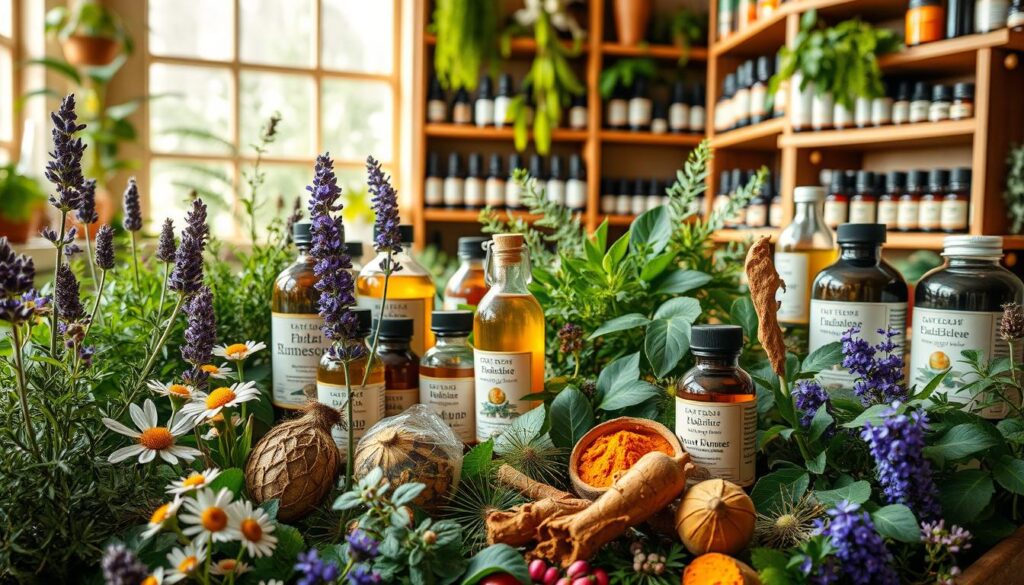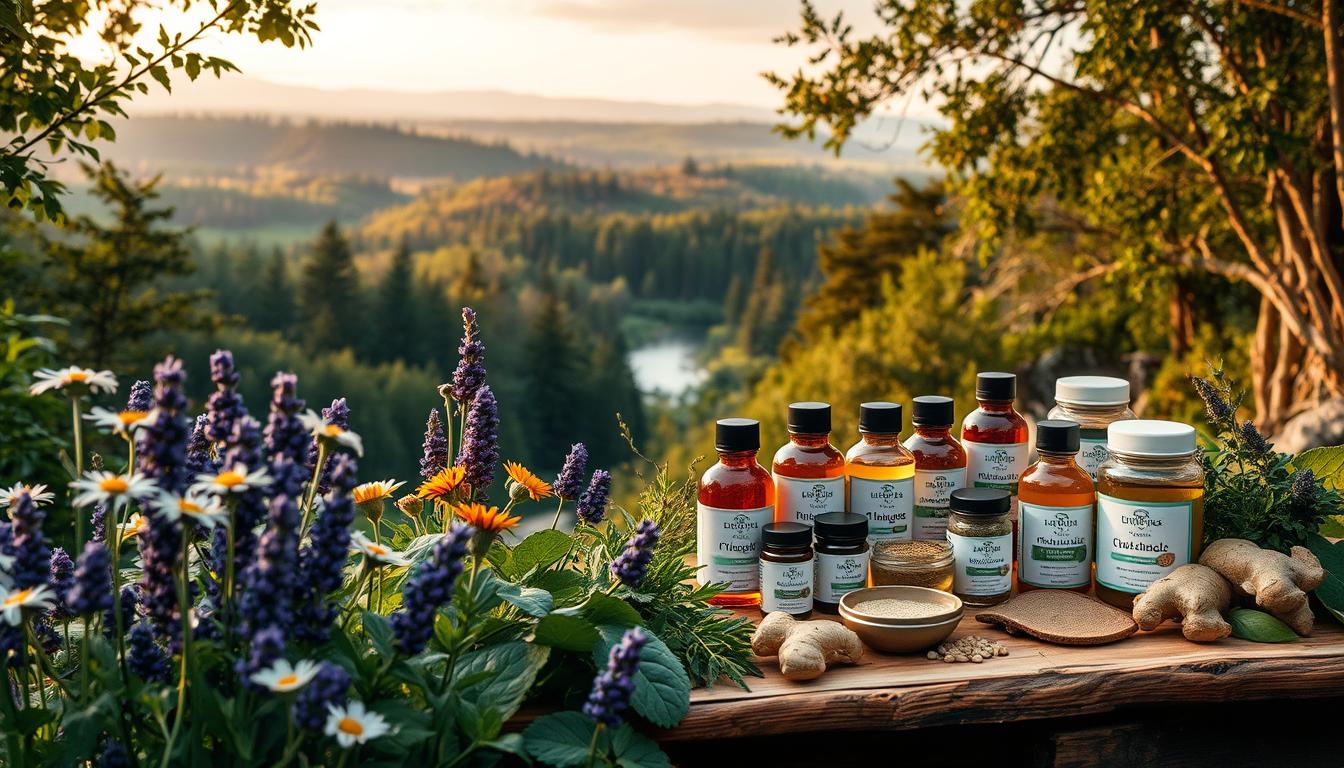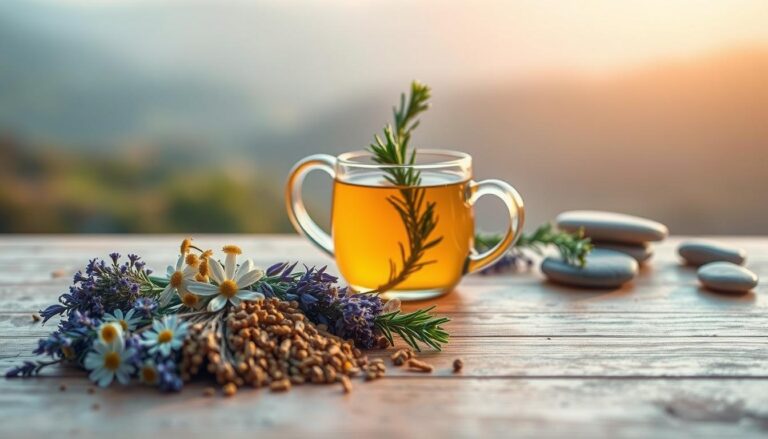Benefits of Natural Herbs: Why They’re the Best for Wellness
Table of Contents
Imagine finding a powerful wellness solution in your kitchen garden or local market. Benefits of Natural Herbs are more than just food—they’re strong herbal remedies. They’ve changed healthcare for thousands of years. The World Health Organization says many countries use these plants for affordable, effective care.
Exploring herbal medicine could change your wellness journey. Studies show whole plant treatments work better than just pharmaceuticals. With 6 out of 10 adults dealing with chronic conditions, natural herbs offer a holistic healing path.
These herbal remedies are backed by science, not just old tales. They boost immunity and help with chronic diseases. Medicinal plants work with your body’s natural healing ways.
To get better results, you can benefit from the benefits of this nutritional supplement
Key Takeaways
- Natural herbs offer affordable and effective healthcare solutions
- Whole plant treatments are more potent than isolated pharmaceutical compounds
- Herbal medicine supports comprehensive wellness approaches
- Medicinal plants can address chronic health conditions naturally
- Scientific research increasingly validates traditional herbal practices
Understanding Natural Herbs and Their Historical Significance
Natural healing has deep roots in human history. Herbal medicine has been a key part of traditional medicine for centuries. It connects cultures through the healing power of plants.
Ancient Medicine Systems and Herbal Traditions
Cultures worldwide have developed deep herbal knowledge. This knowledge still shapes modern wellness today. Important traditional medicine systems came from remarkable civilizations:
- Ayurveda in India: A healing system using herbs for balance
- Traditional Chinese Medicine: Uses herbs for holistic health
- Egyptian medical practices: Used plants for treatment and prevention
- Greek healing traditions: Documented medicinal plant uses
Evolution of Herbal Medicine Through Centuries
Herbal wisdom has changed a lot over time. It moved from ancient folk remedies to scientifically backed treatments. Figures like Hippocrates and Hildegard of Bingen helped start this journey. They laid the groundwork for today’s natural healing.
Cultural Impact on Modern Herbal Usage
Today, we value traditional herbal knowledge a lot. Research has shown that many old practices are still effective. Natural herbs are recognized for their health benefits worldwide.
The mix of herbal knowledge and modern science proves the power of natural healing.
Benefits of Natural Herbs in Modern Wellness

Natural herbs are becoming key players in modern wellness. They offer a holistic way to support your health. Unlike traditional medicine, they target specific bodily systems. This makes plant-based supplements a popular choice for maintaining well-being.
Recent studies have shown the healing power of herbal remedies. A 2021 review found several benefits of adaptogenic herbs:
- Boosting cognitive function
- Enhancing immune system performance
- Managing chronic fatigue
- Reducing stress and supporting mental health
The scientific world is now exploring natural herbs more closely. Here are some interesting research findings:
| Herb | Potential Benefits | Research Highlights |
|---|---|---|
| Rhodiola Rosea | Stress Management | Improved exhaustion and concentration in 12-week study |
| Ashwagandha | Cognitive Performance | Enhanced mental alertness and sleep quality |
| Ginseng | Brain Function | Stimulated mental and sports performance |
Important Note: While natural herbs show promise, always talk to a healthcare professional before starting any new supplements. The FDA doesn’t regulate herbal supplements. So, it’s vital to do your own research and get professional advice.
Adding natural herbs to your wellness journey can be very beneficial. They combine ancient wisdom with modern science. This approach can greatly support your overall health.
The Science Behind Herbal Medicine’s Effectiveness
Herbal medicine is a complex field of botanical healing. Herbal extracts have powerful compounds that interact with your body. They offer natural ways to heal.
Phytotherapy uses botanical compounds to trigger specific responses in your body. These natural ingredients differ from synthetic drugs. They provide a holistic approach to wellness.
Active Compounds in Medicinal Plants
Medicinal plants have several key compounds:
- Flavonoids: Antioxidant-rich molecules
- Alkaloids: Nitrogen-based compounds with therapeutic properties
- Terpenes: Essential oils with healing potential
“Nature’s pharmacy is complex and powerful, offering solutions beyond conventional medicine.” – Dr. Elizabeth Roberts, Herbal Medicine Researcher
Research-Backed Health Benefits
Studies show herbal treatments have great potential. For example:
- Echinacea is as effective as oseltamivir in treating flu
- Garlic helps lower blood sugar in type 2 diabetes patients
- St. John’s Wort is good for mild-to-moderate depression
Bioavailability and Absorption Factors
The success of herbal extracts depends on how well your body absorbs them. Your body’s metabolism and the way you take the herbs matter. This affects how well you absorb the compounds.
About 80% of medicines are broken down by six key enzymes. This shows how herbal supplements interact with our bodies.
Always talk to a healthcare professional before starting herbal treatments. This ensures safety and the best results.
Popular Healing Herbs and Their Properties

Exploring medicinal plants can change how you think about wellness. Herbal remedies have been around for centuries to help with health. Let’s look at some powerful healing herbs that can boost your wellness routine.
Here are some standout herbs with remarkable health benefits:
- Turmeric: A potent anti-inflammatory herb with curcumin, supporting joint health and potentially managing conditions like osteoarthritis
- Ginger: Contains powerful bioactive compounds that help with nausea, blood pressure, and reducing inflammation
- Ashwagandha: An adaptogenic herb that supports stress management, improves cognitive function, and enhances sleep quality
- Garlic: Supports heart health by potentially reducing inflammation and protecting against chronic diseases
- Chamomile: Known for promoting relaxation, reducing stress, and supporting digestive health
Adding these medicinal plants to your daily routine can offer natural support for health issues. Each herb has unique properties that can enhance your wellness plan. Always talk to a healthcare professional before starting any new herbal remedy.
Nature’s pharmacy is rich with healing potential, waiting to be discovered and utilized.
Your journey with herbal remedies can be both exciting and transformative. Start small, listen to your body, and explore the incredible world of natural healing.
Natural Herbs for Mental Health and Stress Relief
Modern life can be tough on our minds. Herbal remedies offer a natural way to handle stress and anxiety. They help balance our emotions.
Many people deal with chronic stress. About 65% of adults face challenges that affect their mental health. Luckily, nature has tools to boost our emotional strength and clear our minds.
Adaptogenic Herbs for Stress Management
Adaptogenic herbs are nature’s secret for fighting stress. These plants help our bodies handle emotional and physical challenges better:
- Ashwagandha: Lowers cortisol levels and builds strength
- Holy Basil (Tulsi): Fights anxiety for over 3,000 years
- Milky Oats: Supports adrenal health and fights chronic fatigue
Herbs for Anxiety and Depression
Many herbal remedies help with emotional health:
- Chamomile: Reduces depression symptoms
- Lavender: Helps relax and improve sleep
- Skullcap: Eases acute anxiety
- Mimosa: Known as the “Tree of Happiness”
Cognitive Enhancement Through Herbs
Herbs can boost our mental clarity and function. Some research shows they can improve mood, reduce stress, and enhance mental performance. Always talk to a healthcare professional before trying new herbs, as everyone reacts differently.
Nature provides powerful tools for mental wellness, offering gentle yet effective support for your emotional health.
Boosting Immunity with Medicinal Plants
More than 80% of the world’s people use medicinal plants to boost their immunity and heal. These plants offer strong support to your body’s natural defense. They have been used for centuries to help people stay healthy.
Nature has many plants that can boost your immune system. Herbs like echinacea, elderberry, and astragalus are especially good at strengthening your immune response.
- Echinacea: Traditionally used by Native Americans, this herb can help reduce the duration of upper respiratory infections
- Elderberry: Contains antimicrobial proanthocyanidins that support immune function
- Astragalus: Recognized for boosting resistance to infections
- Garlic: Contains powerful compounds like allicin that fight infections
Each herb brings unique properties to support your immune system. For example, garlic is most effective when eaten raw. Cooking can reduce its health benefits. Herbs like thyme and oregano also have surprising immune-boosting effects.
“Let food be thy medicine and medicine be thy food” – Hippocrates
When adding these medicinal plants to your health routine, think about how you can use them. You can make teas, add them to soups, or take supplements. Always talk to a healthcare professional to find the best way for you.
Herbal Solutions for Common Health Issues
Herbal remedies are natural ways to handle everyday health problems. They use botanical compounds that are gentle yet effective. This helps you deal with health issues without just using regular medicines.
Digestive Health Support
Your digestive system can get help from certain herbs. Here are some powerful botanical compounds for better gut health:
- Ginger: Reduces inflammation and supports digestion
- Peppermint: Alleviates bloating and stomach discomfort
- Chamomile: Soothes intestinal irritation
Pain Management Options
Natural herbal remedies can help with different types of pain. Research shows that some botanical compounds are good at easing pain:
| Herb | Pain Management Benefits |
|---|---|
| Turmeric | Contains 2-6% curcumin with anti-inflammatory properties |
| Ginger | Limits cytokine production and reduces inflammation |
| Green Tea | Rich in polyphenols that combat inflammatory responses |
Sleep and Relaxation Aids
Natural herbal remedies can help you sleep better and relax. Careful selection of botanical compounds can help your mental health:
- Lavender: Promotes relaxation and improves sleep quality
- Valerian root: May reduce anxiety and stress
- Passion flower: Potentially helps manage anxiety symptoms
Important note: Always talk to a healthcare professional before starting any herbal remedy. The FDA doesn’t regulate herbal supplements as much as medicines. So, how you react can differ.
Safe Usage and Potential Interactions
Exploring plant-based supplements needs careful thought and smart choices. Holistic medicine can greatly improve health, but knowing about possible interactions and safety tips is key.
The FDA has a special way of handling herbal supplements. The Dietary Supplement Health and Education Act of 1994 lets these products avoid the strict approval needed for drugs. This means you, as the user, have to be extra careful.
- Consult healthcare providers before starting any herbal regimen
- Disclose all current medications to prevent potential interactions
- Start with recommended dosages
- Monitor your body’s response to new supplements
Some herbs can really affect how prescription drugs work. For example, St. John’s Wort can cause serious problems when mixed with SSRIs. It’s also important to know the right amount of ginkgo biloba to avoid bad side effects.
It’s also important to know about possible side effects of herbs. Herbs like valerian might make you feel dizzy or upset your stomach. And never drink tea tree oil because it can cause serious brain problems.
Always prioritize professional medical guidance when integrating plant-based supplements into your wellness routine.
Your safety is the most important thing. By being careful and getting advice from experts, you can enjoy the benefits of herbal supplements safely.
Integrating Herbs into Daily Wellness Routine
Starting a natural healing journey with phytotherapy needs careful planning. Adding herbal remedies to your daily routine can change your wellness path. It’s important to know how to use these powerful plants for the best results.
There are many ways to use herbs. Herbal teas are a classic choice, offering gentle extracts. Tinctures give you a strong dose, and adding herbs like sage or turmeric to food is tasty and healing. For brain health, you can add Lion’s Mane mushroom or Ginkgo biloba to smoothies or supplements.
Dosage Guidelines for Optimal Results
Being consistent is key in phytotherapy. Experts say to use no more than five single herbal extracts or three compound formulas a day. Change your herbal routine every three to six months, matching the seasons. Remember, 1 teaspoon of dried herbs is like 3 teaspoons of fresh ones. Start with small doses and increase as needed to find what works best for you.
Always listen to your body and talk to healthcare experts before trying new herbs. Keeping track of how you feel can help you improve your natural wellness plan. This way, you can get the most out of these amazing plants.
FAQ
What are natural herbs and why are they important for wellness?
Natural herbs are plants with healing powers. They’ve been used for centuries to keep people healthy. These plants work on the body as a whole, offering natural alternatives to drugs. They’re packed with compounds that help our bodies stay well.
How long have herbs been used in traditional medicine?
Herbal medicine has been around for thousands of years. Ancient places like China, Egypt, India, and Greece used them. They knew about the healing power of plants long before modern medicine.
Are herbal remedies scientifically proven to be effective?
Yes, many herbal remedies have been proven to work. Scientists are studying these plants to learn how they help us. They do this through careful studies and research.
Can herbs help with mental health and stress management?
Yes, some herbs like ashwagandha, rhodiola, and holy basil can help with stress and anxiety. They help your body handle stress better. This can make you feel mentally clearer.
How can I safely incorporate herbs into my wellness routine?
First, talk to a healthcare professional, especially if you have health issues or take drugs. Start with small amounts and buy from trusted sources. Listen to how your body reacts. This way, you can use herbs safely and effectively.
Which herbs are best for boosting immunity?
Herbs like echinacea, elderberry, astragalus, and ginger are great for the immune system. They have compounds that boost your immune response and fight off illnesses.
Are there any potential risks with using herbal remedies?
While mostly safe, herbal remedies can interact with drugs and cause side effects. Some can thin blood or affect hormones. Always tell your doctor about any herbal supplements you’re taking.
How do I prepare herbs for consumption?
Herbs can be used in many ways, like teas, tinctures, capsules, oils, and food. The best way depends on the herb and your goals. Some are better as teas, while others work better in supplements.
Can herbs help with specific health issues like digestion or sleep?
Yes, some herbs are great for specific problems. Peppermint helps with digestion, valerian root aids sleep, and chamomile reduces anxiety. These natural remedies offer gentle ways to tackle common health issues.
How long does it take to see results from herbal supplements?
Herbal remedies often need consistent use and patience. Some people feel the effects right away, while others may take weeks or months. How long it takes depends on your health, the herb, and how you use it.







